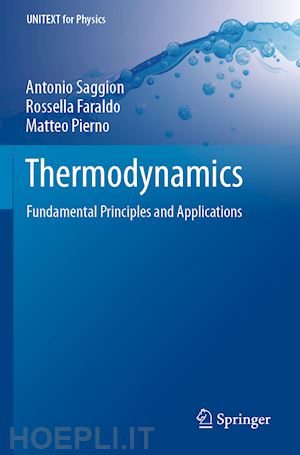
Questo prodotto usufruisce delle SPEDIZIONI GRATIS
selezionando l'opzione Corriere Veloce in fase di ordine.
Pagabile anche con Carta della cultura giovani e del merito, 18App Bonus Cultura e Carta del Docente
This book offers a comprehensive overview of thermodynamics. It is divided into four parts, the first of which equips readers with a deeper understanding of the fundamental principles of thermodynamics of equilibrium states and of their evolution. The second part applies these principles to a series of generalized situations, presenting applications that are of interest both in their own right and in terms of demonstrating how thermodynamics, as a theory of principle, relates to different fields. In turn, the third part focuses on non-equilibrium configurations and the dynamics of natural processes. It discusses both discontinuous and continuous systems, highlighting the interference among non-equilibrium processes, and the nature of stationary states and of fluctuations in isolated systems. Lastly, part four introduces the relation between physics and information theory, which constitutes a new frontier in fundamental research.
The book includes step-by-step exercises, with solutions, to help readers to gain a fuller understanding of the subjects, and also features a series of appendices providing useful mathematical formulae. Reflecting the content of modern university courses on thermodynamics, it is a valuable resource for students and young scientists in the fields of physics, chemistry, and engineering.
I. FUNDAMENTAL PRINCIPLES.- 1. The macroscopic observer.- 2. The concept of empirical temperature.- 3. The first Principle of Thermodynamics.- 4. The second Principle of Thermodynamics.- 5. Efficiency of thermal engines.- 6. The Fundamental Relation and the thermodynamic potentials.- 7. Maxwell Relations.- II. APPLICATIONS.- 8. One component Systems.- 9. van der Waals equation.- 10.Phase transitions.- 11.Surface Systems.- 12.Electrostatic Fields.- 13.Magnetic Fields.- 4.Thermodynamics of radiation.- 15.Osmotic phenomena and complex fluids.- 16.Low temperatures.- III. IRREVERSIBLE PROCESSES.- 17.Irreversible processes.- 18.Thermodynamics of continua.- IV. BIBLIOGRAPHY.- Bibliography.- V. ANALYTICAL LIST.- VI. APPENDIXES.- A. Appendix 1. Two useful mathematical relations.- B. Appendix 2. The pressure exerted by a particle gas.- C. Appendix 3. M. Planck and the problem of black-body radiation.- D. Appendix 4. Thermodynamics and Information.
Rossella Faraldo is Professor of Mathematics and Physics at the “C. Roccati” Lyceum in Rovigo (Italy). She holds a doctoral degree in Physics and until 2015 was an associated researcher in the Section of Theoretical Physics, Istituto Nazionale di Fisica Nucleare (INFN) and the Physics Department of Padua University. Her main interests are Epistemology, Philosophy of Science, Foundations of Physics, and Methodology of Didactics, and for several years she has been a lecturer on the course in Methodology and Didactics of Physics in the Faculty of Sciences at Padua University. Dr. Faraldo is the author or co-author of a number of articles on the Foundations of Science. She has contributed to a book on Causality published by Oxford University Press and to the proceedings of the Italian Physical Society and has also written various articles for Enciclopedia Italiana. She is co-author of (2010) Spazio, Tempo e Spazio-Tempo in un Ambiente di Apprendimento (Cortina, Padova 2010).
Antonio Saggion was Professor of General Physics in the Faculty of Sciences, Padua University (Italy) from 1980 until 2012. He has vast teaching experience in various fields of Classical Physics and Astrophysics, and in particular was Professor of Thermodynamics from 1969 to 1992 and from 2000 to 2016. Between 2000 and 2012 Dr. Saggion was Director of the School for the Methodology and Didactics of Physics in the Faculty of Sciences, Padua University. He is a member of the International Astronomical Union (IAU) since 1970 and is a founder and member of the MAGIC Collaboration. His main interests are Theoretical Astrophysics, Very High Energy Gamma Ray Astrophysics, Epistemology, and the Foundations of Physics. He is the author or co-author of books on Classical Mechanics and Thermodynamics and on didactic methodology. In the field of astrophysical research he has authored more than 140 papers in international peer-reviewed journals and he has also contributed to the proceedings of many international conferences.
Matteo Pierno is Associate Professor in the Department of Physics and Astronomy of the University of Padova (Italy), where he has been working since 2007. He teaches courses of Mechanics, Thermodynamics and Soft Matter. Dr. Pierno obtained a Master degree in Physics at the University of Milano (Italy) in 1999 and a PhD at the Polytechnic of Milano in 2004. In 2005 he worked as Marie Curie fellow in the University of Montpellier 2 (France) within the frame of the European Research and Training Network on the Dynamical Arrested State of Matter. Dr. Pierno has been managing several national and international research projects on Soft Matter, Liquids at Interfaces, Nanotribology. From 2014 he is in the Executive Board of the PhD School of Material Sciences in the University of Padova, and he is also in charge of a local program for the dissemination of knowledge in material sciences among high schools. He authored more than 60 publications in peer reviewed international journals and he has also contributed to the proceedings of many international conferences.











Il sito utilizza cookie ed altri strumenti di tracciamento che raccolgono informazioni dal dispositivo dell’utente. Oltre ai cookie tecnici ed analitici aggregati, strettamente necessari per il funzionamento di questo sito web, previo consenso dell’utente possono essere installati cookie di profilazione e marketing e cookie dei social media. Cliccando su “Accetto tutti i cookie” saranno attivate tutte le categorie di cookie. Per accettare solo deterninate categorie di cookie, cliccare invece su “Impostazioni cookie”. Chiudendo il banner o continuando a navigare saranno installati solo cookie tecnici. Per maggiori dettagli, consultare la Cookie Policy.